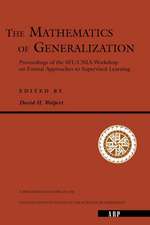Decision Making with Imperfect Decision Makers: Intelligent Systems Reference Library, cartea 28
Editat de Tatiana Valentine Guy, Miroslav Kárný, David H. Wolperten Limba Engleză Hardback – 5 noi 2011
To date such societies have been investigated from an economic and gametheoretic perspective, and even to a degree from a physics perspective. However, little research has been done from the perspective of computer science and associated disciplines like machine learning, information theory and neuroscience. This book is a major contribution to such research.
Some of the particular topics addressed include: How should we formalise rational decision making of a single imperfect decision maker? Does the answer change for a system of imperfect decision makers? Can we extend existing prescriptive theories for perfect decision makers to make them useful for imperfect ones? How can we exploit the relation of these problems to the control under varying and uncertain resources constraints as well as to the problem of the computational decision making? What can we learn from natural, engineered, and social systems to help us address these issues?
| Toate formatele și edițiile | Preț | Express |
|---|---|---|
| Paperback (1) | 982.86 lei 6-8 săpt. | |
| Springer Berlin, Heidelberg – 23 aug 2016 | 982.86 lei 6-8 săpt. | |
| Hardback (1) | 989.13 lei 6-8 săpt. | |
| Springer Berlin, Heidelberg – 5 noi 2011 | 989.13 lei 6-8 săpt. |
Din seria Intelligent Systems Reference Library
- 20%
 Preț: 1050.57 lei
Preț: 1050.57 lei - 20%
 Preț: 1157.60 lei
Preț: 1157.60 lei - 20%
 Preț: 648.44 lei
Preț: 648.44 lei - 20%
 Preț: 650.08 lei
Preț: 650.08 lei - 20%
 Preț: 1005.64 lei
Preț: 1005.64 lei - 5%
 Preț: 968.88 lei
Preț: 968.88 lei - 20%
 Preț: 1052.67 lei
Preț: 1052.67 lei - 20%
 Preț: 1171.46 lei
Preț: 1171.46 lei - 20%
 Preț: 1164.84 lei
Preț: 1164.84 lei - 20%
 Preț: 815.83 lei
Preț: 815.83 lei - 20%
 Preț: 989.96 lei
Preț: 989.96 lei - 20%
 Preț: 1063.41 lei
Preț: 1063.41 lei - 20%
 Preț: 925.45 lei
Preț: 925.45 lei - 20%
 Preț: 504.37 lei
Preț: 504.37 lei - 18%
 Preț: 1113.26 lei
Preț: 1113.26 lei - 20%
 Preț: 1920.04 lei
Preț: 1920.04 lei - 20%
 Preț: 990.62 lei
Preț: 990.62 lei - 20%
 Preț: 651.57 lei
Preț: 651.57 lei - 20%
 Preț: 645.97 lei
Preț: 645.97 lei - 20%
 Preț: 660.16 lei
Preț: 660.16 lei - 20%
 Preț: 647.13 lei
Preț: 647.13 lei - 20%
 Preț: 654.05 lei
Preț: 654.05 lei - 20%
 Preț: 649.93 lei
Preț: 649.93 lei - 20%
 Preț: 648.11 lei
Preț: 648.11 lei - 20%
 Preț: 657.99 lei
Preț: 657.99 lei - 20%
 Preț: 656.84 lei
Preț: 656.84 lei - 20%
 Preț: 1624.04 lei
Preț: 1624.04 lei - 20%
 Preț: 642.98 lei
Preț: 642.98 lei - 20%
 Preț: 649.60 lei
Preț: 649.60 lei - 20%
 Preț: 651.23 lei
Preț: 651.23 lei - 20%
 Preț: 653.06 lei
Preț: 653.06 lei - 20%
 Preț: 1002.99 lei
Preț: 1002.99 lei - 20%
 Preț: 645.14 lei
Preț: 645.14 lei - 20%
 Preț: 658.33 lei
Preț: 658.33 lei - 20%
 Preț: 644.98 lei
Preț: 644.98 lei - 20%
 Preț: 646.62 lei
Preț: 646.62 lei
Preț: 989.13 lei
Preț vechi: 1236.42 lei
-20% Nou
Puncte Express: 1484
Preț estimativ în valută:
189.27€ • 198.02$ • 157.23£
189.27€ • 198.02$ • 157.23£
Carte tipărită la comandă
Livrare economică 02-16 aprilie
Preluare comenzi: 021 569.72.76
Specificații
ISBN-13: 9783642246463
ISBN-10: 364224646X
Pagini: 212
Ilustrații: XIV, 195 p.
Greutate: 0.48 kg
Ediția:2012
Editura: Springer Berlin, Heidelberg
Colecția Springer
Seria Intelligent Systems Reference Library
Locul publicării:Berlin, Heidelberg, Germany
ISBN-10: 364224646X
Pagini: 212
Ilustrații: XIV, 195 p.
Greutate: 0.48 kg
Ediția:2012
Editura: Springer Berlin, Heidelberg
Colecția Springer
Seria Intelligent Systems Reference Library
Locul publicării:Berlin, Heidelberg, Germany
Public țintă
ResearchCuprins
1 Bounded Rationality in Multiagent Systems Using DecentralizedMetareasoning.- 2 On Support of Imperfect Bayesian Participants.- 3 Trading value and information in MDPs.- 4 Game theoretic modeling of pilot behavior during mid-air encounters.- 5 Scalable Negotiation Protocol based on Issue-Grouping for Highly Nonlinear Situation.- 6 The Social Ultimatum Game.- 7 Neuroheuristics of Decision Making: from neuronal activity to EEG.
Textul de pe ultima copertă
Prescriptive Bayesian decision making has reached a high level of maturity and is well-supported algorithmically. However, experimental data shows that real decision makers choose such Bayes-optimal decisions surprisingly infrequently, often making decisions that are badly sub-optimal. So prevalent is such imperfect decision-making that it should be accepted as an inherent feature of real decision makers living within interacting societies.
To date such societies have been investigated from an economic and gametheoretic perspective, and even to a degree from a physics perspective. However, little research has been done from the perspective of computer science and associated disciplines like machine learning, information theory and neuroscience. This book is a major contribution to such research.
Some of the particular topics addressed include:
• How should we formalise rational decision making of a single imperfect decision maker?
• Does the answer change for a system of imperfect decision makers?
• Can we extend existing prescriptive theories for perfect decision makers to make them useful for imperfect ones?
• How can we exploit the relation of these problems to the control under varying and uncertain resources constraints as well as to the problem of the computational decision making?
• What can we learn from natural, engineered, and social systems to help us address these issues?
To date such societies have been investigated from an economic and gametheoretic perspective, and even to a degree from a physics perspective. However, little research has been done from the perspective of computer science and associated disciplines like machine learning, information theory and neuroscience. This book is a major contribution to such research.
Some of the particular topics addressed include:
• How should we formalise rational decision making of a single imperfect decision maker?
• Does the answer change for a system of imperfect decision makers?
• Can we extend existing prescriptive theories for perfect decision makers to make them useful for imperfect ones?
• How can we exploit the relation of these problems to the control under varying and uncertain resources constraints as well as to the problem of the computational decision making?
• What can we learn from natural, engineered, and social systems to help us address these issues?
Caracteristici
Why and how can imperfection be coped with in real life Proposes possible ways to approaches suitable to addressing design of decision strategies for and by imperfect designers and decision makers Edited outcome of best contributions to a NIPS’2010 workshop: “Decision Making with Imperfect Decision Makers” Written by leading experts in the field

















